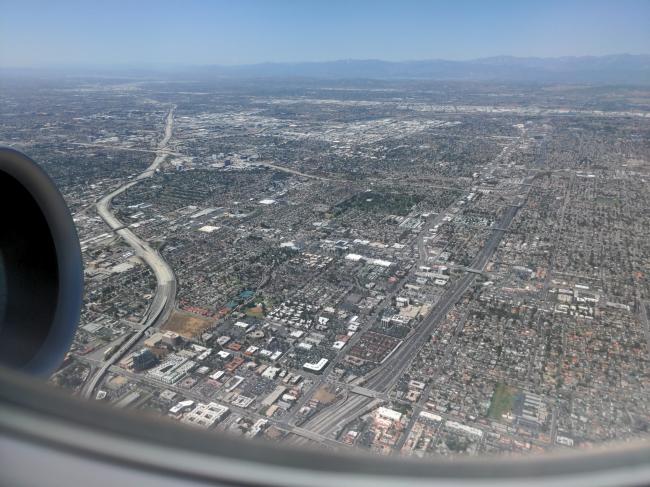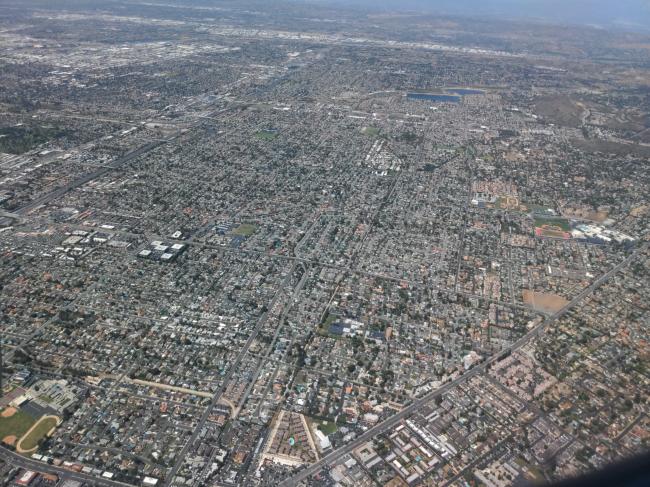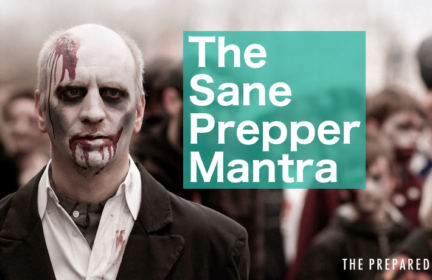How would those who live in a city survive without trucks?
While taking a business trip to Southern California I looked out the window and saw nothing but buildings, roads, and urban yuck as far as the eye could see.
At any time, I was probably looking at a million or two people. The thought that crossed my mind is how are all these people supported? I didn’t see any farmland, no large bodies of water, and where was the power plants? It seems like the food, water, and even power was transported in. What if all that stopped? By looking at the pictures you can see a few small bodies of water or a few football fields or parks that could be turned into farmland. I still don’t see how the vast number of people I was looking at could have enough resources and survive though. It would require a mass exodus out of the city or a large portion of the population to die off.
If you live in a city, it is even more important to store water, food, and fuel. And have a way to protect those resources because the hundreds of people around you who are not prepared will get pretty desperate.
-
Comments (7)
-
HappySoul - April 16, 2022
Alisa, you are so right! These photographs are classic evidence for the old adage in the preparedness community: “Get your beans and your bullets ready first”. We live around 60 minutes out from two mountain passes that top out just above 8,000 feet in elevation. When recent snows shut down the only two routes through said mountains for 140 miles north and south, it only took 60 to 70 hours for supermarkets to be reduced to about 10% of their normal stock. One state trooper told me the two highways through said mountain passes normally carry around 4.5 million dollars AN HOUR in cargo. Most people who live in large cities I talk to have no concept of how dependent they are on commercial truck and rail transport. It pays to be prepared to take care of yourself and your loved ones. And it pays to have a strong, well-developed community of neighbors and friends around you, so you can help those who are not prepared when trouble hits, while minimizing risk to yourself and your allies in times in trouble. Truckers call the lane lines the life lines of the USA for good reason.
-
Pops - April 17, 2022
Wherever you live it is exactly the same Alisa. EVERYTHING comes from somewhere else. Even if there is thriving production of certain things in your area, it’s likely they are designed to go elsewhere.
At the beginning of the pandemic I lived in a small town on the Columbia River in Washington state. It was founded as a lumber town, and it had several large paper mills that made toilet paper on the river. Yet the TP shelves at the local stores were just as barren as everywhere else. Why? Because the local mills were not designed to produce consumer product. Most of what they made was shipped overseas, and what TP they made was cheap paper for gas stations and office buildings. It was packaged by the pallet, “not for individual sale.” There were no machines to package consumer product, no distribution channels if there were, the rolls had no barcode or SKU. Billion dollar TP business within eyesight and there you sit, brokenhearted.
The problem with globalisation that no one talks about is it is based on one finite resource: fossil oil. Without cheap diesel, things don’t come to your town from around the world, and whatever it is that your town makes can’t get to the other side of the world either. This is the problem with the whole defund oil mantra, we must replace oil first or we’ll all starve.
The Russian problem is just the beginning here. The US believes we’re Saudi America but the new oil we think we discovered was literally the bottom of our barrel. They are drilling into and breaking up the very source rock where all the vast reservoirs of conventional oil (that we have already used up) came from. The problem is that “light tight oil” IS light, in other words it makes gasoline and plastics great but diesel is heavier with greater energy. We are exporting the plastic (ethane) and importing heavy oil to make into diesel from elsewhere.
Elsewhere like the tar sands of Canada. Which, like the shale of the US is another last ditch effort. Tar is what’s left after good oil migrates to the surface (because there was no impervious rock layer to trap it in a reservoir) and there is degraded and the “light” oil vaporizes. They use natural gas generated steam to wash the sand then reclaim the oil from the dirty water, if you can believe that.
Alice Friedman wrote the book on diesel trucks, literally. Her’s is a great website, she links to vast amounts of research. Not all of it is optimistic.
This is the great predicament we’re in, and no amount of stocking a BOB will help. Most of what we talk about re: prepping, is merely packing a lunch for a day on the Titanic.
-
Sun Yeti - April 18, 2022
Agree about supply chains. In fact, in a lot of ways rural supply chains are more precarious. I live on the outskirts of a major city, we have roads, ports, airports, and rail lines. If some of that infrastructure is unusable, we still have other options.
Also, although high gas prices increase the cost of shipping and thus the goods I buy, I rarely need to drive as I can walk, bike, and use public transit. On the other hand, my parents who live in a more rural area, have to drive a few miles just to get rid of their trash/recycling, and 20 or 30 miles for groceries.
Oil is a finite resource, and we are scraping the bottom of the barrel, but I’m less gloomy about peak oil than I was some years ago. A solar/wind/hydro/battery/long distance transmission electric grid is a solved problem from a technical and economic perspective, we just need more of it, and it’s scaling fast. Electric cars are also a solved problem from a technical perspective; they’re still somewhat more expensive, but getting cheaper as they scale. Electric freight trucks are still in development, but there don’t seem to be major technical barriers to using basically the same tech as electric cars. Electric air and sea freight are still pie in the sky, but that may just mean we do a lot less intercontinental trade in the future, which is not civilization ending.
Of course, just because there are workable solutions doesn’t mean we can’t still screw up the energy transition. But ten years ago I wasn’t even sure there was a way out of getting crushed by peak oil, so I’m less pessimistic than I used to be about that.
Re: urban yuck, I also have an aversive reaction sometimes to images like that, but on the other hand think how much environmental destruction would happen if each of those people wanted two to ten acres in the country.
-
Pops - April 18, 2022
I may not sound like it but I am more optimistic too, at least on the personal scale. You should have heard me 20 years ago!
The thing about LTO is it did buy us some time for PV and battery tech to mature. 10 years ago PV was still prohibitively expensive. Now, although it is pretty involved you can put together a usable DIY system for $1/watt including storage.
You may have read Tom Murphy, he came up with a theory about transition he called the energy trap. Basically it describes the situation in trying to transition after energy is already becoming more expensive due to supply shortfall. That is the point where more folks will get onboard the transition bandwagon. Problem is, building out the generation/grid/storage, electrification of transport, efficiency of everything is all reliant on fossils and will increase demand right at the moment of falling supply. So, the price of energy rises way higher than it would in doing nothing.
I’d argue some portion of the US administration’s unpopularity at the moment is due to high energy price and we’ve not started any big switch. Lots of their opposition argues just that, do nothing.
-
TraceContributor - April 18, 2022
Though I’m not quite as pessimistic, Pops is right. It’s all about petroleum and the petroleum dollar (but the economics is another topic).
We have to have the energy and renewables are getting better — but petroleum is going the way of the dinosaur (lol). It’ll be an interesting race to see if alternatives become successful enough in time.
-
Alisa Felix - April 18, 2022
Everything does come from somewhere else, but the thought that I had on that flight was that there isn’t as many natural resources such as cultivable land or water bodies. A rural city might have more options on how to continue if the trucks stopped.
-
Pops - April 18, 2022
No doubt Alisa. I agree completely. I’ve never lived in a city.
But even in the sticks folks are tuned to the big distribution channels. The ABCD mafia: Archer Daniels Midland (ADM), Bunge, Cargill and Louis Dreyfus control 90% of grain grown. Cargill, Tyson Foods, JBS, and National Beef Packing own 75%+ of beef, hogs, chicken.
Much of US farmland is owned by absentee landlords and corporate investors and even the managers have little tie to locals and definitely are in no position to do farm gate sales.
One thing to do is support local growers. CSAs, direct sale dairies, local meat packers, U-Pick farms, farmers market of course. This alone is a reason to take up canning and otherwise preserving local harvests.
-
-
- Neutrality for the sake of survival and how to manage the full spectrum of ideologies - 13 hours ago
- Essential medical reference books for the prepper library - 16 hours ago
- News for the week of 2024-07-22 - 16 hours ago
- AR15 stock weight - 4 days ago
- Burning Candles - 5 days ago
This forum is heavily moderated to keep things valuable to as many people as possible. Full community policies are here. The basics:
- 1. Be nice to each other.
- 2. Stay focused on prepping.
- 3. Avoid politics, religion, and other arguments.
- 4. No unfounded conspiracies, fake news, etc.
- 5. Debate ideas, not people.


